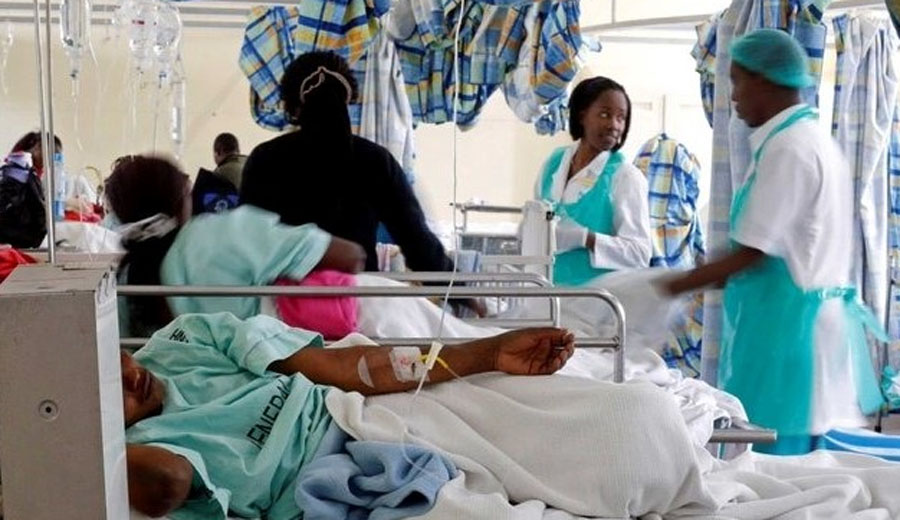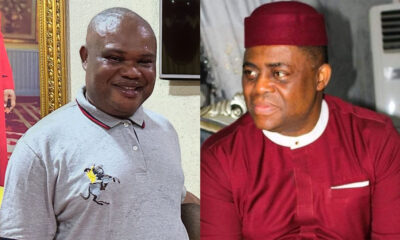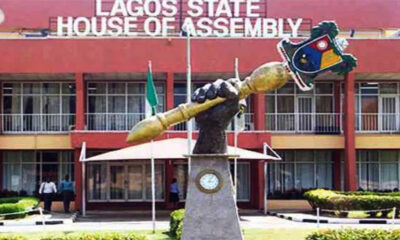Health
Boy With Missing Intestine: New twist as private Medical Doctors accuse Lagos Assembly of bias

Boy With Missing Intestine: New twist as private Medical Doctors accuse Lagos Assembly of bias
The Association of Nigerian Private Medical Practitioners (ANPMP), Lagos State Chapter, has accused the ad-hoc committee constituted by the Lagos House of Assembly to investigate the circumstances surrounding the alleged disappearance of the small intestines of late Adebola Akin-Bright of bias.
The chairman of the ad-hoc committee, Noheem Adams, had revealed that Doctor Abayomi Baiyewu of Obitoks Hospital who performed surgeries twice on Adebola is not a qualified surgeon.
Adams said during investigation, the committee learnt from Baiyewu that he is not a surgeon but only relied on his experience as a medical doctor to perform the surgeries.
Consequently, the Speaker of the House, Mudashiru Obasa, directed the Clerk, Olalekan Onafeko, to write to the state police command for the arrest of Baiyewu.
Obasa further asked the committee to look into other grey areas including inviting officials of the Health Facility Monitoring and Accreditation Agency (HEFAMAA) which has the law-backed responsibility to monitor private hospitals operating in the state.
But reacting in a statement jointly signed by its Lagos Branch Chairman, Dr Makinde Akinlemibola and General Secretary, Dr Debo Adebiyi, ANPMP said that the panel demonstrated witch-hunt.
According to the association, while the panel attempted to reduce the session of its member to a ‘yes’ or ‘no’, that of the doctor from the government hospital involved in the management of the boy was allowed to give a detailed report.
It pointed out that the panel not including a doctor, made it difficult for the panel to properly investigate the matter.
READ ALSO:
-
48 Nigerian-trained nurses, midwives in UK under investigation for exam fraud
-
Nigerian Army arrests five fake soldiers in Lagos using uniforms for theft, other crimes
-
WAEC to Introduce CBT for WASSCE — HNO
ANPMP noted that there was clear evidence that members of the panel were ‘genuinely ignorant’ of some of the workings of the medical profession which became obvious from some of the questions posed during their sitting.
The association called for a thorough investigation by a well-constituted professional team, adding that the only body empowered by law to investigate this kind of case is the Medical and Dental Council of Nigeria (MDCN).
“It is important to note that the honourable members of the panel also demonstrated a clear case of witch-hunt and working to a predetermined answer by attempting to reduce the session to a “Yes” and “No” session for our member from the private hospital while the doctor from the government hospital involved in the management of the deceased was given the latitude to give a detailed report.
“The bias was taken to a ridiculous level when the same doctor who operated on the patient at the government hospital was asked to assess and determine the response of the doctor who operated on the patient in the private hospital. A case of being a judge in your case you would say!
“Of course, the doctor seeing the absurdity of the request cleverly declined.
“A similar panel set up earlier by the Ministry of Health (HEFAMAA) that had a surgeon on the seat had confirmed that the X-ray films taken while the patient was on admission at LASUTH also showed the presence of the intestines.
“Information available to us also confirms that a large mass of black tissue was removed at LASUTH and handed to the patient’s mother to take to the histopathology laboratory by the team that operated on the patient at LASUTH after they came out of the theatre.
“Strangely, the government through their agency, HEFAMAA rushed to seal up the theatre of the private hospital, while the government hospital where the patient was operated on and eventually died was left to continue to operate as if nothing happened.
“We have to emphasise here that matters of this nature deserve thorough investigation by a well-constituted professional team and the only body empowered by law to investigate such cases is the Medical and Dental Council of Nigeria, MDCN,” the statement read partly.
READ ALSO:
-
Police arrest 20 kidnappers in Taraba
-
Why I didn’t tell people Mohbad was my son – Mother
-
JUST IN: Benue Governor floors PDP at tribunal, appreciates residents
ANPMP stated that based on available scientific evidence at its disposal, it has been able to establish some privileged and incontrovertible facts.
The association explained that an ultrasound scan and X-ray done at LASUTH on June 19 confirmed that there was the presence of normal intestinal movement.
“The patient was first operated on at Obitoks Hospital 6th of March 2023 on account of a ruptured appendix after he was referred from a medical centre where he was managed for typhoid enteritis.
“It was discovered on the operation table that there was an abscess which will require a different management approach to drain. (The appendix at that time must not be removed because of the abscess). The patient however got better afterwards.
“The patient presented again about 3 months later and a diagnosis of obstructed intestine was made which necessitated operating on the abdomen again to relieve the obstruction.
“It is a fact that the parents were invited into the operating room to see and confirm the point of obstruction and the 4 inches of the small intestine to be removed, out of the about 24 feet of the normal small intestine.
“It was also established that the patient was referred to the tertiary centre 8 days post-operation at the request of the parents. It is a fact that the patient was admitted to LASUTH on the 17th of June.
“The patient was however eventually operated upon on the 14th of July 2023 (i.e. 28 days after admission in LASUTH). It is therefore strange how the story of the missing/disappearing intestine gained prominence in the media in a patient who was on admission to a public facility (LASUTH) for almost 28 days.
“The question to then ask is, how did the patient survive for 28 days without intestine? In addition to this, it was also established as confirmed by ultrasound scan and X-ray done at LASUTH on the 19th of June (I.e. 3rd day on admission) that there was the presence of normal intestinal movement,” the statement added.
Adebola died on Tuesday, after two surgeries performed at a private hospital and a corrective surgery at the Lagos State University Teaching Hospital (LASUTH).
Boy With Missing Intestine: New twist as private Medical Doctors accuse Lagos Assembly of bias
Health
Just In: Nigeria receives 846,000 malaria vaccine doses

Just In: Nigeria receives 846,000 malaria vaccine doses
Nigeria has received 846,000 doses of a groundbreaking malaria vaccine from development partners to reduce the country’s high incidence of the disease, especially among children and other vulnerable groups.
Prof. Muhammad Pate, Coordinating Minister of Health and Social Welfare, announced during the event on Thursday in Abuja that the vaccines were expected to play a pivotal role in lowering malaria-related deaths.
The News Agency of Nigeria (NAN) reports that large clinical trials in Africa proved the vaccine, RTS,S/AS01 (Mosquirix) as effective in reducing contracting malaria cases and mortality among young children.
Nigeria is the third African country to introduce the vaccine, following Ghana and Kenya, which began using it in 2023.
Malaria affects 97 per cent of Nigeria’s population. Its transmission occurs year-round in southern regions and lasts up to three months in the northern regions.
The primary malaria vectors are Anopheles coluzzii and Anopheles gambiae, with Anopheles funestus playing a secondary role in some areas.
The vaccines come as Nigeria intensifies efforts to reduce malaria-related deaths under the National Malaria Strategic Plan (NMSP) 2021–2025.
Pate said the vaccine would significantly boost the country’s ongoing malaria elimination efforts.
“Our target is to prioritize regions most affected by malaria, particularly in rural areas where access to healthcare is limited,” he said.
He also said the vaccine rollout would begin in high-burden regions before expanding nationwide.
According to him, global health partners, including WHO, UNICEF, and Gavi, are providing technical and financial support to ensure the successful implementation of the vaccine.
READ ALSO:
- Biden okays $4.5bn student debt relief as vote nears
- Don Jazzy raises Verydarkman NGO with N100m
- EFCC calls 15th witness in Fayose fraud trial
Just In: Nigeria receives 846,000 malaria vaccine doses
Health
Cholera ravages 28 LGs in Kano, kills 45

Cholera ravages 28 LGs in Kano, kills 45
The Coordinator of the Kano State Centre for Disease Control (KNCDC), Prof. Muhammad Adam Abbas, has revealed that a recent cholera outbreak has claimed 45 lives across 28 local government areas in the state.
He stated this on Tuesday at a retreat organised by the Kano State’s Ministry of Health in Kaduna.
According to Prof. Abbas, cholera thrives in environments with poor sanitary conditions, and maintaining high standards of personal and food hygiene is vital in combating its transmission.
READ ALSO:
- Police in Imo burst robbery gang terrorising Owerri
- Ahead Ondo poll, PDP demands removal of INEC commissioner
- Pro-Fubara lawmakers react to Amaewhule-led faction declaring their seats vacant
He advised that frequent handwashing, maintaining a clean environment, thoroughly washing fruits and vegetables and proper food storage are essential preventive measures.
He also highlighted the increased risk during the rainy season, as running water can wash contaminants, including dirt and faeces, into low-lying wells.
To mitigate this, he recommended building parapet embankments around wells to prevent contamination.
Prof. Abbas further noted that the government is taking proactive steps to control the outbreak, including chlorinating water sources in communities with poor sanitation and those affected by the disease.
Cholera ravages 28 LGs in Kano, kills 45
Health
Breakthrough in wound healing, electric suture creates excitement

Breakthrough in wound healing, electric suture creates excitement
A new type of suture that combines electrical stimulation with traditional suturing methods has been developed.
It has been demonstrated that this mechanoelectric suture, which is constructed from biodegradable materials and generates electric fields in response to movement, significantly accelerates wound healing and lowers the risk of infection.
This innovative approach could revolutionise wound closure procedures and offer patients a faster and safer healing process.
In an experiment in rats, the new strong, flexible thread hastened wound healing by transforming muscle movement into electricity, researchers report in Nature Communications.
According to materials scientist Chengyi Hou of Shanghai’s Donghua University, the substance “could change how we treat injuries” if it is finally shown to be safe for use in humans.
READ ALSO:
- Rumour of Mohbad’s widow Wunmi expecting another child sparks shocking reactions
- Bobrisky: I was treated badly during my visit to EFCC office, says Verydarkman (VIDEO)
- Kano: Lebanese jailed 14 years for sexually exploiting two teenage girls
Although prior methods depended on large external batteries, researchers already knew that applying electricity to sutures helped accelerate the healing process. The body provides the energy for the new sutures.
The thread is composed of magnesium, a metal that the body may eventually absorb, and biodegradable polymers. The central layer of the thread rubs against the outer shell when the muscles around the sutures contract and relax, which transfers electrons to the shell and produces electricity.
Hou and colleagues used the thread’s electrical stimulation to treat artificial wounds in lab dishes. After 24 hours, fibroblasts, which are critical to healing, reduced the wound area from 69 percent to 11 percent. Untreated artificial wounds reduced in size from 69 percent to 33 percent after 24 hours.
Rodents treated with electrical sutures recovered faster and were less likely to acquire infections than rats treated with regular sutures or left untreated. Next, the team intends to try the sutures on bigger animals.
Breakthrough in wound healing, electric suture create excitement
-

 News2 days ago
News2 days agoFIRS announces recruitment of young graduates
-

 metro3 days ago
metro3 days agoUpdated: Army says reports of COAS Lagbaja’s death fake news
-

 metro2 days ago
metro2 days agoOluwo chased me out when I visited him – Ooni (VIDEO)
-

 News2 days ago
News2 days agoOsinbajo traitor, can’t talk about integrity – Reno Omokri
-

 metro2 days ago
metro2 days agoFani-Kayode: How my aide died in hotel after attending church
-

 Business1 day ago
Business1 day agoWe’re settling out of court with NNPC, others — Dangote
-

 metro2 days ago
metro2 days agoBREAKING : DSS replaces Tinubu’s chief security officer
-

 News2 days ago
News2 days agoYou can’t overrule Supreme Court on LG autonomy – Klinsmann tells Soludo














